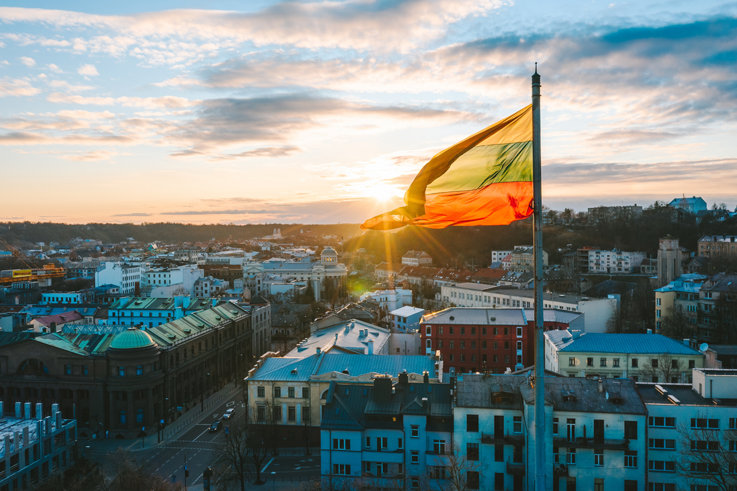
-
HOME
-
WHAT IS STANDOur Mission Our Values Our Help Contact
-
WHAT WE FIGHT FORReligious Freedom Religious Literacy Equality & Human Rights Inclusion & Respect Free Speech Responsible Journalism Corporate Accountability
-
RESOURCESExpert Studies Landmark Decisions White Papers FAQs David Miscavige Religious Freedom Resource Center Freedom of Religion & Human Rights Topic Index Priest-Penitent Privilege Islamophobia
-
HATE MONITORBiased Media Propagandists Hatemongers False Experts Hate Monitor Blog
-
NEWSROOMNews Media Watch Videos Blog
-
TAKE ACTIONCombat Hate & Discrimination Champion Freedom of Religion Demand Accountability
Lithuania’s Cold Climate Toward Religious Freedom
Google “What are the disadvantages of living in Lithuania?” and you will get “the cold climate.”

Lithuania’s Jehovah’s Witnesses would agree. Theirs has been a frigid reception from that nation’s parliament on the issue of the faith’s religious recognition. After serving as a positive presence in Lithuania for a century, the Jehovah’s Witnesses decided to apply for official religious recognition—a status that would allow them the rights enjoyed by other faiths—the right to perform marriages that have official state sanction, the right to provide religious education in schools and the right to have their religious services broadcast by the state.
But after allowing the application to gather cobwebs for six years, Lithuania’s parliament cold-shouldered it.
According to sociologist of religions Massimo Introvigne, both of the government’s objections are dubious.
The government’s rejection rested on two points: (1) the faith’s creed forbids military service and (2) it does not allow its parishioners to receive blood transfusions.
The problem, however, is that Jehovah’s Witnesses have observed these practices in Lithuania for decades without a sniff of protest from the government and, indeed, have had their religious freedom repeatedly validated by the European Court of Human Rights (ECtHR). In light of these factors, Lithuania’s denial of the community’s religious recognition takes on the color of an abuse of religious freedom.
According to sociologist of religions Massimo Introvigne, both of the government’s objections are dubious. Introvigne points out that courts, including the ECtHR—whose rulings apply to the entire continent—have already rejected the Lithuanian legislature’s arguments against the Jehovah’s Witnesses.
In June 2022, for example, in a case involving a Jehovah’s Witness conscientious objector, the ECtHR called Lithuania’s handling of the plaintiff a violation of the European Convention on Human Rights, which protects freedom of thought, conscience and religion.
The U.S. State Department, in its annual religious freedom report, also weighed in on the religion’s forbidding of military service, noting that, as conscientious objectors, Jehovah’s Witnesses were nevertheless “willing to perform alternative civilian national service in lieu of conscription, should such an option be created. However, such an option did not exist.”
Other faiths count conscientious objectors among their members, and their home countries often provide for such, giving them opportunities to serve and help without directly contributing to bloodshed. By not offering such avenues of alternate service, the Lithuanian government creates a Catch-22 for Jehovah’s Witnesses.
Moreover, regarding their refusal to accept blood transfusions, the State Department wrote, “Members pointed out that the state had existing legal means to overrule parents in cases of children’s health.”
Even more to the point, with advances in medicine, hospitals can now provide high-quality care that does not involve a blood transfusion. Jehovah’s Witnesses cite medical studies that indicate that “patients, including children, who do not receive transfusions usually fare as well as or better than those who do accept transfusions.” And when Jehovah’s Witnesses need a doctor who can provide bloodless treatment, they can seek the help of Hospital Liaison Committees, which exist for that sole purpose.
As attested in a 2022 letter, the Lithuanian Ministry of Justice “is not aware of any cases where parents or guardians, only one of whom professes the Jehovah’s Witness faith, have disagreed on the application of blood transfusion to a minor.”
Again, it’s all in the public record. Parliament is well aware that blood transfusions have never been a problem. It is also not clueless regarding the bind its military concocted with no alternative solution for conscientious objectors. So, if there is no issue with either of these matters, what exactly is the problem? Is the problem the Jehovah’s Witnesses’ failure to toe the line legally, or is it the Lithuanian parliament’s blatant violation of the community’s religious liberty?
During the parliamentary debate before the vote, some lawmakers warned that rejecting the Jehovah’s Witnesses’ application could be regarded as discriminatory and would make Lithuania liable for censure by the ECtHR.
Yes, it would. Lithuania is already treading on thin ice in the religious inclusion department, having been censured once before by the watchdog body in 2021 for denying recognition to Romuva, an ancient Baltic religious association.
During the debate and on the official record, many members of Parliament called Jehovah’s Witnesses “decent, good citizens” and “excellent people.”
According to the Jehovah’s Witnesses, the ratio of these “excellent people” to the general population of Lithuania is 1 to 963. Introvigne writes, “As good and law-abiding citizens, as many Lithuanian MPs describe them, they deserve an attitude of respect, dialogue, and cooperation, not the hostility and discrimination of the kind prevailing in nearby Russia.”
The icy reception accorded the Jehovah’s Witnesses is just the latest episode of Lithuania’s age-old tradition of freezing out religious communities. Christianity, too, found the frigid faith environment there at first unconducive to spiritual life. Lithuania and Christianity stared each other down for centuries until Lithuania finally blinked and in 1387 became the last European country to be converted from paganism to Christianity.
The good lawmakers of Lithuania are forewarned that the Jehovah’s Witnesses may turn out to be just as stubborn as the early Christians.
And just as successful.









